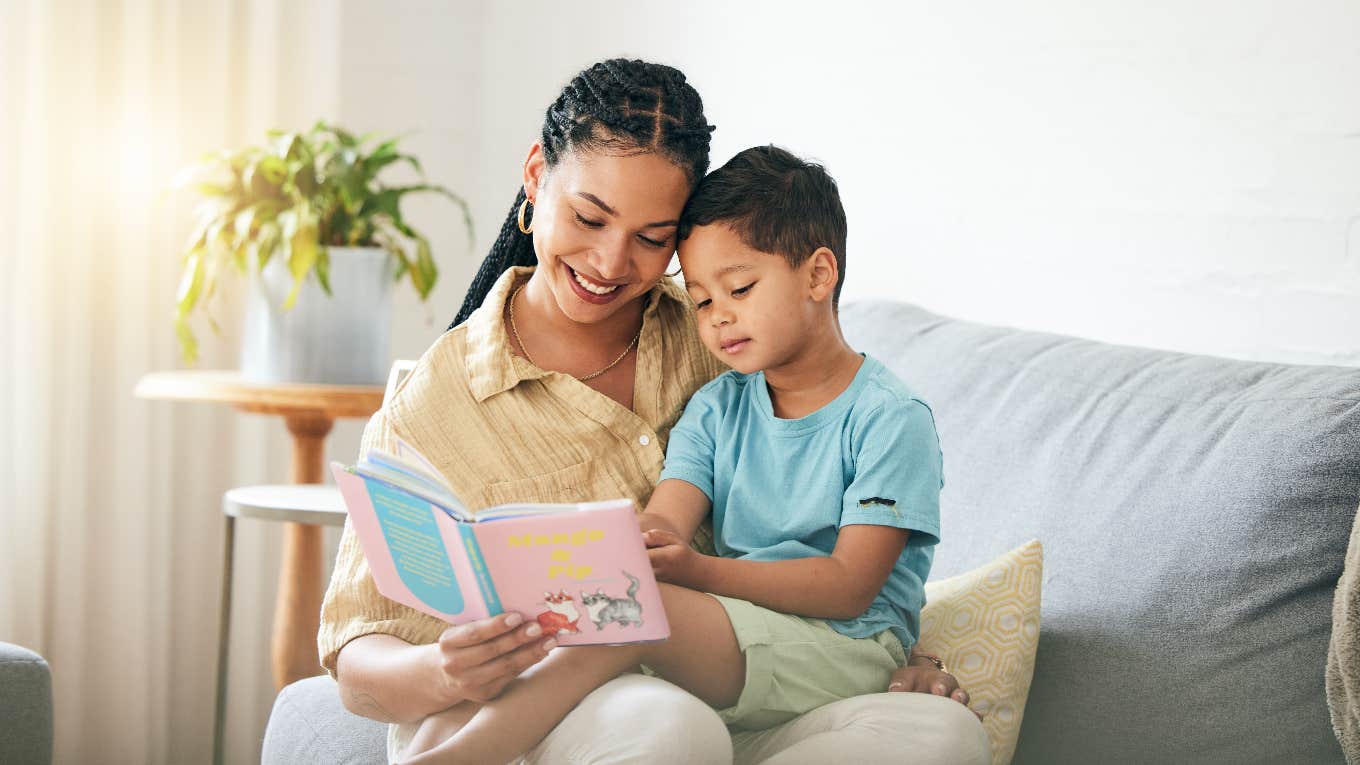Survey Shows Gen Z Parents Aren't Reading To Their Kids Because It's 'Not A Fun Thing To Do'
They're choosing technology over books, putting their children at a disadvantage.
 PeopleImages.com - Yuri A | Shutterstock
PeopleImages.com - Yuri A | Shutterstock For many kids, being read to by their parents is a hallmark of childhood. From "Goodnight Moon" and "The Gruffalo" to chapter books and children's novels, the options are truly endless, as are the benefits. This habit provides parent-child bonding time, improves kids' language skills, and even helps with emotional regulation.
However, it appears that things are changing, and not for the better. We’re seeing the emergence of the first Gen Z parents, many of whom are choosing technology over actual books. It seems that kids are suffering because of it.
A survey found that Gen Z parents aren't reading to their kids because it's 'not a fun thing to do.'
The publishing company HarperCollins UK reported on the findings from NielsenIQ BookData’s 2024 "Understanding the Children’s Book Consumer" survey, and the findings were startling, especially when compared with previous data. For example, in 2012, 55% of children between the ages of 5 and 10 chose to read for fun. Now, that number is just 32%.
 LStockStudio | Shutterstock
LStockStudio | Shutterstock
This decrease can be attributed in part to the way parents’ attitudes towards reading to their children have changed. Among children up to age 4, 41% are read to frequently, down from 64% in 2012. Additionally, girls are read to more than boys, perpetuating societal gender stereotypes.
Equally concerning is the reason why fewer children are being read to. Only 40% of parents surveyed said that they thought reading to their children was "fun for me," and 28% of Gen Z parents felt that reading was "more a subject to learn" than something to be enjoyed.
Unfortunately, these attitudes are largely replicated in children, who also think of reading as something purely educational, rather than fun. Reading is even on the decline at school, where only 24% of children between 5 and 10 are being read to during class time by their teachers.
The Consumer Insight Director at Farshore and HarperCollins Children’s Books, Alison David, addressed how worrisome these trends are. "Being read to makes reading fun for children," she said. "So, it’s very concerning that many children are growing up without a happy reading culture at home. It means they are more likely to associate reading with schoolwork, something they are tested on and can do well or badly, not something they could enjoy."
A report from The Guardian found that America’s 'literacy crisis' is affecting children disproportionately.
According to a national education report from Axios, U.S. students had record-low reading comprehension scores last year, and a shocking number are reading well below their grade level. Of course, this is partially due to the COVID-19 pandemic and ever-increasing technology usage. However, it certainly doesn't help that parents are forging reading time with their kids.
Writing for The Guardian, Alaina Demopoulos referred to an Instagram post from former teacher Spencer Russell to illustrate the seriousness of the issue. On Russell’s account, Toddlers Can Read, he asked parents why they weren’t reading to their kids. Some replied saying that they found it too boring or time-consuming, while others felt their kids made it too difficult by interrupting.
Demopoulos also referenced a TikTok made by @mrs_q.teaches. "I bet you I can’t tell who was breast-fed versus formula-fed, but I can tell you who has grown-ups that read to them every night," the teacher said, adding in the caption, "PSA TO ALL PARENTS: PLEASE read to your kids!"
However, many adults, with or without kids, aren't reading, either. The U.S. Census Bureau’s Survey of Public Participation in the Arts found that only 48.5% of adults had read a book in the past year in the fall of 2023. The number was 54.6% 10 years prior.
Reading may not be everyone’s favorite activity, but it is well worth it.
While not everyone loves reading, it is a very enriching activity, especially when you’re young and growing your mind. Writing for The Child Mind Institute, author Hannah Sheldon-Dean explained the many benefits of reading to your kids.
"Reading to young children is an important way to help them build language skills," she said. "It exposes them to new words and ways of using language. It also helps them learn general information about the world, which makes it easier for them to learn about new subjects once they get to school."
 Pixel-Shot | Shutterstock
Pixel-Shot | Shutterstock
Beyond language development, reading to kids helps them build empathy and learn to handle difficult feelings. It provides parents with opportunities, not just to bond with their children, but to discuss emotions and how to cope with them.
"As kids read books about people whose lives are different from their own (and especially stories told from the perspectives of those people), they gain an appreciation for other people’s feelings, as well as other cultures, lifestyles, and perspectives," Sheldon-Dean added. "Seeing characters in books experience big emotions like anger or sadness lets kids know that these feelings are normal — and gives them a chance to talk about their own difficult feelings, too."
Whether parents want to or not, they should make an effort to read to their kids. While it may not be the most enjoyable activity, it is undeniably beneficial for everyone involved.
Mary-Faith Martinez is a writer with a bachelor’s degree in English and Journalism who covers news, psychology, lifestyle, and human interest topics.

